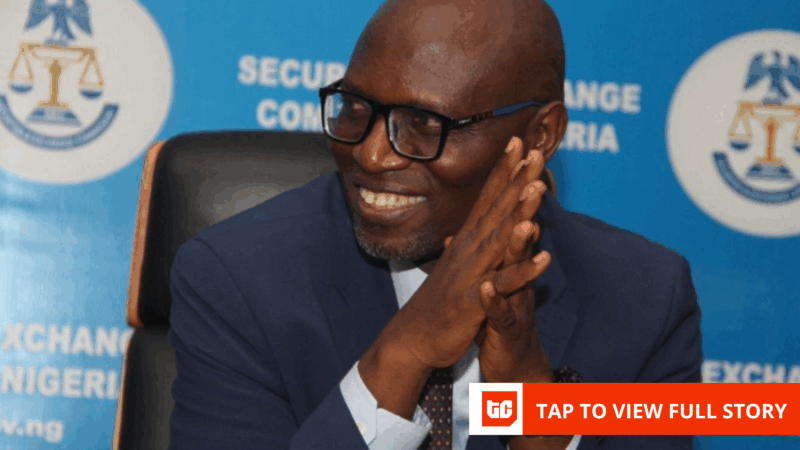More than a year since Nigeria’s Securities and Exchange Commission (SEC) issued its first provisional crypto licences under its regulatory sandbox programme, the regulator has yet to move to the next phase of approvals. Only two crypto exchanges, Quidax and Busha, received provisional licences in August 2024, despite earlier promises to transition them into full regulatory regimes within a year.
“We’ve been actively engaging with the SEC in recent weeks as part of the transition process toward full licencing,” Busha told TechCabal in an emailed response. “As with the earlier provisional phase, we appreciate the [SEC’s] thoroughness and rigour at this stage. We look forward to achieving full licencing soon, in line with the timelines and guidance provided by the SEC and other relevant bodies.”
In December 2024, the SEC pledged to fast-track the licencing of virtual asset service providers (VASPs) in 2025, as part of a broader plan to establish a clear framework for digital assets. But by April, the regulator cited due diligence challenges as a reason for the delay, a stance that has frustrated operators waiting in limbo.
“How hard can it be to licence crypto exchanges that have met the requirements stipulated in the Investment and Securities Act?” asked one crypto industry operator who requested anonymity to discuss a sensitive topic. “The industry has operated for far too long without a proper licencing framework. Now that we finally have one, let people know they’re bound by its rules, then flush out those that haven’t applied but are still operating in the shadows.”
Under the Investment and Securities Act (2025), virtual asset service providers (VASPs) and digital asset exchanges (DAXs) are required to meet strict conditions, including capital adequacy, data protection and cybersecurity standards, and full compliance with anti-money laundering (AML) and counter-terrorism financing (CTF) rules. They must have an office in Nigeria, appoint a compliance officer, disclose key transaction data, and submit regular activity reports to the SEC.
In June 2024, the SEC launched the Accelerated Regulatory Incubation Programme (ARIP), a one-year sandbox designed to test and monitor crypto businesses seeking full approval. The programme was meant to help regulators better understand how exchanges operate while allowing firms to adjust to compliance requirements. More than a year later, there has been little visible progress in expanding the programme or granting new approvals.
“The excuse the SEC is giving is that it’s trying to do a thorough job,” said Rume Ophi, a financial analyst. “The question is, how will they implement the tax regime coming next year without proper operator licences when only two exchange platforms are licenced? When South Africa rolled out, they issued 59 crypto licences. Nigeria is still on two. What does the SEC mean it’s still monitoring them for more than a year?”
Senator Ihenyen, executive chair of the Virtual Asset Service Providers Association (VASPA), an African advocacy group that engages regulators on digital assets, agrees that the pace of licencing has become “very concerning,” warning that the delays point to deeper systemic issues.
“The licencing process in the country is moving at a snail’s pace,” said Ihenyen. “But rather than blaming the SEC alone, the problem is more systemic. There is a clog in the entire regulatory fabric that even the most efficient securities and exchange commission may struggle to navigate.”
He noted that the process involves multiple agencies, including the Office of the National Security Adviser (ONSA), which conducts security screenings for prospective licencees, slowing progress.
“The excuse the SEC is giving is that it’s trying to do a thorough job. The question is, how will they implement the tax regime coming next year without proper operator licences when only two exchange platforms are licenced?”
“To avoid regulatory bottlenecks, Nigeria needs a comprehensive legislative framework on virtual assets adoption and regulation,” Ihenyen said. “We’ve [VASPA] proposed a Virtual Asset Service Act (VASA) to the House of Representatives to address these delays.”
Nigeria’s crypto sector has grown rapidly, with at least 30 startups now operating in the space, ranging from exchanges and wallets to remittance platforms and payment providers. Many of these firms are waiting for clarity on licencing or seeking entry into the ARIP programme.
“Quidax and Busha do not represent the breadth of the crypto industry,” said the crypto operator. “There are more than 30–40 crypto startups, and many more I’m not even familiar with are launching every day. Either licence more exchanges or open the ARIP to more established players. We can’t go around saying we’re a regulated industry. Some operators have relegated licencing to the background and continued to operate as though there’s no regulation, because, in reality, there isn’t.”
The SEC has taken some steps to bring order to the market, including introducing a regulatory sandbox, issuing provisional licences and working with the Central Bank of Nigeria (CBN) on compliance rules for virtual asset providers. But progress has been slow. The result is a framework that looks complete on paper but remains stuck in partial execution, where enforcement often comes before clear rules or operational guidance.
According to Ihenyen, Nigeria does not benefit from the fragmented laws because they create confusion and inconsistency. They force regulators to rely on enforcement actions, such as sanctions, prosecutions, and random security measures, to shape the behaviour of operators, rather than a pre-defined set of rules and clear coordination.
“Regulation by enforcement is a major pullback in Nigeria,” Ihenyen said. “What this country needs is a more collaborative, proactive, and responsive approach that provides legal clarity and fosters innovation, building trust and confidence in the system, not entrenching distrust, anxiety, and uncertainty. More resources and time should be invested in achieving the level of trust and confidence the sector needs to contribute to the GDP [gross domestic product], while also ensuring national security and the rule of law.”
Regulators and operators should see national security as inseparable from economic inclusivity. When policy focuses on creating opportunities for citizens and investors to thrive, it strengthens both economic and national security, said Ihenyen.
Crypto has become a critical financial watchlist for regulators, who alleged that untraceable crypto transactions were significantly responsible for devaluing the naira. As the SEC has deepened its oversight of transaction monitoring and reporting, it has given authorities greater visibility into digital asset movements and strengthened the enforcement of AML and CTF controls.
However, technical deficiencies have also slowed progress. Few SEC officials, including its head of virtual assets and fintech supervision, have publicly shared on LinkedIn that they completed basic crypto fundamentals courses over the past year, highlighting an ongoing gap in technical understanding.
The SEC did not respond to a request for comments regarding issuing more provisional licenses, telecom restrictions for crypto startups, and its efforts at inter-agency collaboration to clarify regulatory grey areas.
Nigeria’s multi-agency structure adds another layer of complexity. The Central Bank of Nigeria (CBN)’s payments systems policy department has been actively monitoring virtual assets, particularly stablecoins. That position was echoed by Chai Gang, deputy director of the department, on the sidelines of Moonshot by TechCabal, who said the regulator’s evolving understanding of virtual assets requires multi-agency collaboration.
Despite this lack of regulatory clarity, the government plans to tax crypto operators, with non-compliance attracting fines of ₦10 million ($6,700) in the first month and ₦1 million ($699) for subsequent months of infraction. Beginning in January 2026, retail users will also be taxed on the sale, exchange, or transfer of virtual assets, mining and staking income, bounties, and airdrops.
While the SEC is the recognised regulator for virtual asset operators, Nigeria’s push for an effective tax regime will require the Federal Inland Revenue Service (FIRS) to work closely with the SEC and the centralised exchanges under its oversight to ensure coherent coordination.
“I just hope [full crypto licencing] doesn’t get into next year,” said Ophi. “Because we need proper tracking and infrastructure to understand what is going to happen in the tax regime coming next year.”
Crypto exchanges are expected to play a central role in tax reporting and compliance, providing the administrative framework for Nigerians to file taxes on digital asset transactions.
Yet, without additional licenced exchanges or a clear pathway for admitting new startups into the ARIP sandbox, there is no mechanism for verifying these obligations or enforcing compliance, leaving more questions than answers ahead of the new tax regime.
“Linked to licencing is also the CBN’s stance,” said the industry operator. “You say crypto isn’t illegal and have implemented an ISA that covers it, yet banks still can’t work with us directly.”
The government says crypto is legal, but banks are being fined for crypto-related transactions. Accounts are being closed, and users are forced into peer-to-peer (P2P) markets dominated by foreign exchanges that cannot be properly monitored. Yet local startups are being chased to pay taxes while the bulk of crypto transactions go to those unlicenced exchanges, according to the industry operator.
Ihenyen pointed to the CBN’s guidelines on how banks should onboard VASPs as a part of this confusion. The framework, he said, tried to “shave operators’ heads in their absence,” introducing conditions and operational rules without consulting the industry or creating a direct licencing process.
“The government says crypto is legal, but banks are being fined… Accounts are being closed, and users are forced into P2P markets… Yet local startups are being chased to pay taxes while the bulk of crypto transactions go to those unlicenced exchanges.”
Until the CBN sets a clear path for VASPs to operate in areas like remittances, payments, and cross-border transactions, it risks handing regulatory control to agencies without the authority or capacity to manage it, said Ihenyen. That vacuum encourages regulatory arbitrage, where operators exploit gaps.
This top-down approach isn’t limited to the CBN; the SEC has also issued directives without industry input, including its proposed ₦1 billion ($700,000) capital requirement for virtual asset service providers.
“The SEC’s introduction of excessive and prohibitive licencing fees and capital requirements for VASPs is one of the results of the absence of industry participation in the rule-making process from day one—at least as far as the fee structure and capital requirements are concerned,” said Ihenyen. “The SEC should consider introducing a tiered licencing system for fees and capital requirements. Since VASPs now fall under its capital markets framework, their requirements should not exceed those of existing traditional operators.”
For now, Nigeria’s efforts to build a formal regulatory regime for crypto remain stuck between ambition and execution. Without more licences or clearer coordination between the SEC, the CBN, financial monitoring agencies, and the tax authorities, the country risks taxing a market it has yet to properly regulate, leading to a disconnect that only creates uncertainty in Africa’s biggest digital asset economy.








